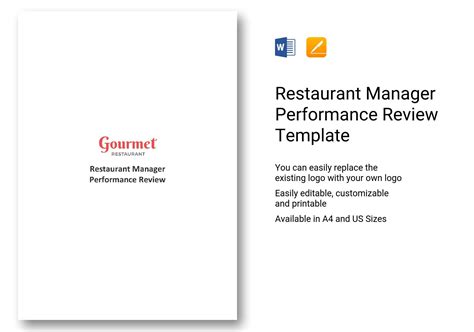Restaurant managers play a crucial role in the success of any dining establishment. Their responsibilities range from staff management to customer satisfaction, inventory control, and maintaining high-quality food and service standards. A performance review template is essential for evaluating their effectiveness and providing constructive feedback. Here's a comprehensive guide to creating a restaurant manager performance review template.
The Importance of Performance Reviews for Restaurant Managers
Performance reviews are a vital tool for evaluating an employee's job performance and providing feedback for improvement. For restaurant managers, these reviews help assess their ability to manage staff, control costs, maintain quality standards, and ensure customer satisfaction. Regular performance reviews enable restaurant owners and upper management to identify areas of improvement, provide guidance, and set realistic goals for future growth.
Key Performance Indicators (KPIs) for Restaurant Managers
To create an effective performance review template, it's essential to establish Key Performance Indicators (KPIs) that reflect the critical aspects of a restaurant manager's job. Some common KPIs include:
- Sales growth and revenue management
- Customer satisfaction ratings
- Staff retention and turnover rates
- Inventory control and cost management
- Food quality and safety standards
- Time management and productivity
Restaurant Manager Performance Review Template Structure
The following structure provides a comprehensive outline for a restaurant manager performance review template:
I. Introduction
- Brief overview of the performance review process
- Purpose of the review
- Discussion of the evaluation period
II. Job Performance Evaluation
- Sales and Revenue Management
- Sales growth and revenue targets
- Profit margin analysis
- Cost control and expense management
- Customer Satisfaction
- Customer feedback and complaint resolution
- Online review analysis (e.g., Yelp, Google)
- Customer loyalty and retention programs
- Staff Management
- Staff retention and turnover rates
- Employee training and development programs
- Team performance and morale
- Inventory Control and Cost Management
- Inventory turnover and stock management
- Cost control and waste reduction
- Supplier relationships and negotiations
- Food Quality and Safety Standards
- Food quality and presentation
- Food safety and hygiene standards
- Regulatory compliance (e.g., health department ratings)
III. Goals and Objectives
- Short-term Goals (Next 30, 60, 90 days)
- Specific objectives and targets
- Action plans and timelines
- Progress monitoring and evaluation
- Long-term Goals (Next 6, 12 months)
- Strategic objectives and targets
- Action plans and timelines
- Progress monitoring and evaluation
IV. Development and Growth
- Training and Development Needs
- Identified training and development requirements
- Recommended training programs and courses
- Career Development and Advancement
- Career goals and aspirations
- Opportunities for growth and advancement
V. Conclusion
- Summary of key performance strengths and weaknesses
- Action plan and next steps
- Follow-up and evaluation schedule
Embedding Images

Additional Tips and Best Practices
- Regularly review and update the performance review template to reflect changing business needs and priorities.
- Ensure the template is fair, objective, and unbiased.
- Use specific examples and data to support performance evaluations.
- Set realistic goals and objectives that align with the restaurant's overall vision and mission.
- Provide constructive feedback and guidance for improvement.
Gallery of Restaurant Manager Performance Review Templates





FAQ Section
What is the purpose of a restaurant manager performance review template?
+The purpose of a restaurant manager performance review template is to provide a structured framework for evaluating a restaurant manager's job performance, identifying areas of improvement, and setting realistic goals for future growth.
What are the key performance indicators (KPIs) for a restaurant manager?
+Common KPIs for a restaurant manager include sales growth and revenue management, customer satisfaction ratings, staff retention and turnover rates, inventory control and cost management, and food quality and safety standards.
How often should a restaurant manager's performance be reviewed?
+Restaurant manager performance reviews should be conducted regularly, ideally every 6-12 months, to ensure timely feedback and guidance for improvement.
By following this guide and creating a comprehensive restaurant manager performance review template, you can effectively evaluate your restaurant manager's performance, provide constructive feedback, and set realistic goals for future growth and success.
